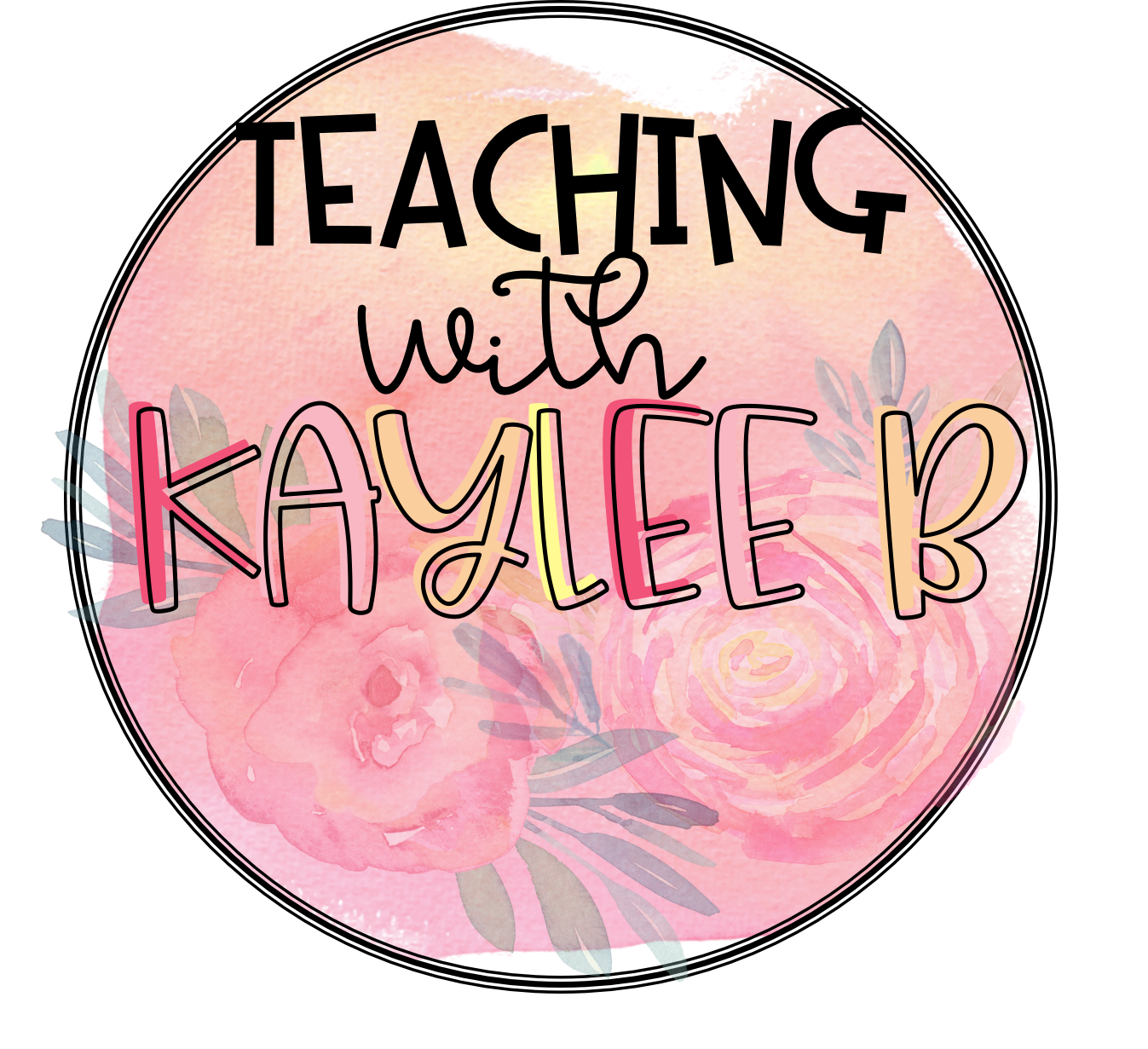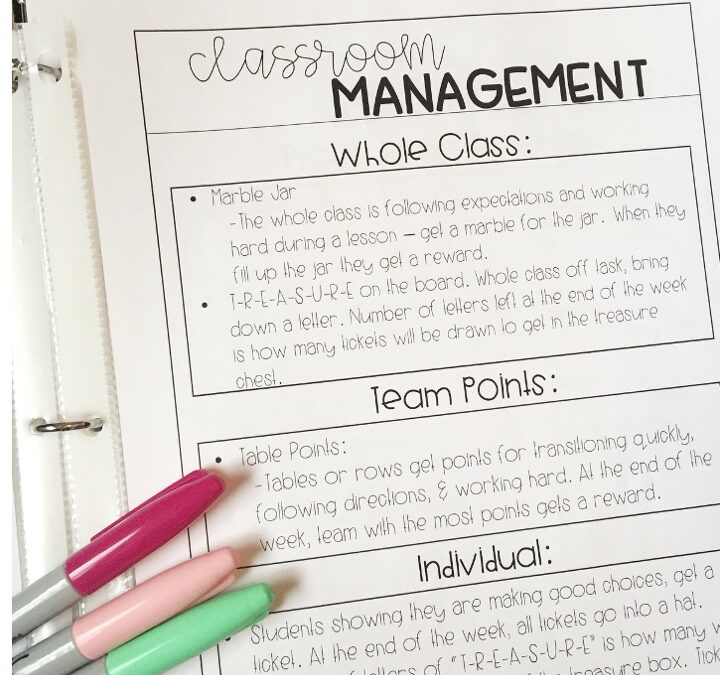If you are a little shy like me, then teacher interviews can be a little nerve wrecking. What really helped me get the confidence I needed during teacher interviews and eventually land a great job as a 2nd grade teacher was to write down my answer to common interview questions teachers are asked (which I’ll show you how I did this in a creative way later on.) So instead of having you go through the painful learning curve that I did, I thought I would share common interview questions teachers are asked and how to answer them.
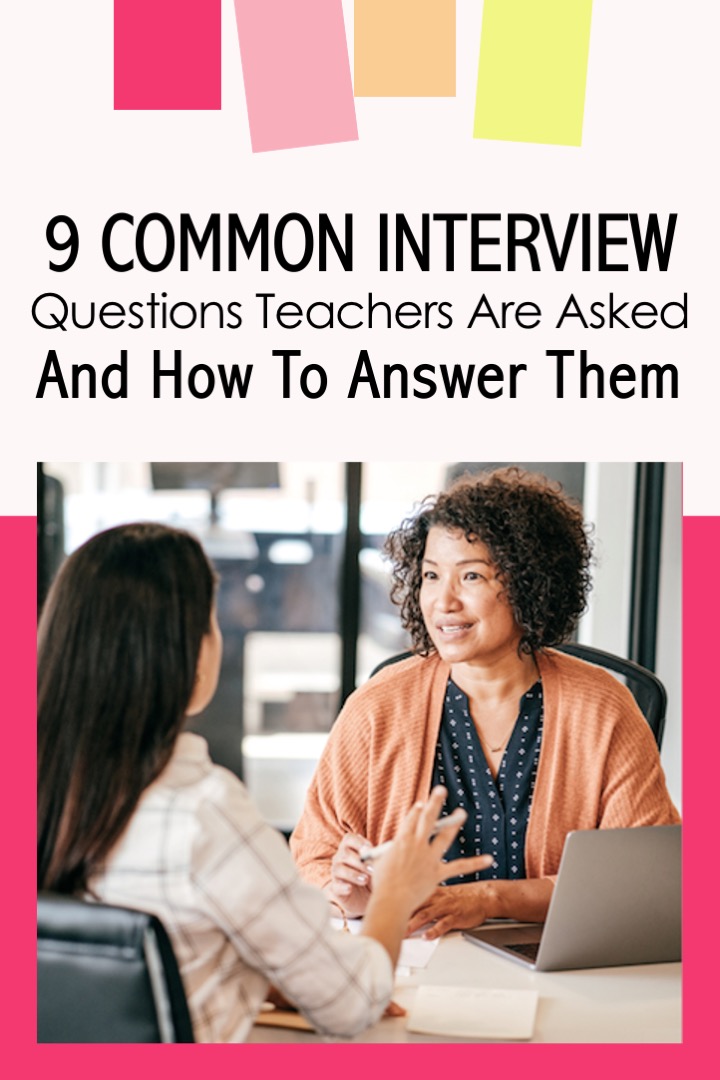
Prepare for success in the classroom by unraveling the common interview questions teachers are asked – your guide to acing that teaching opportunity!
Interview Questions Teachers Are Asked
Here are some of the common questions teachers are asked in interviews: Tell us about yourself, what’s your teaching philosophy, what does classroom management look like in your classroom, how have you helped a student with difficult behavior, how do you promote a positive classroom environment, how do you communicate with parents, how do you meet students’ unique needs, how have you collaborated with other teachers, and what questions do you have for us.
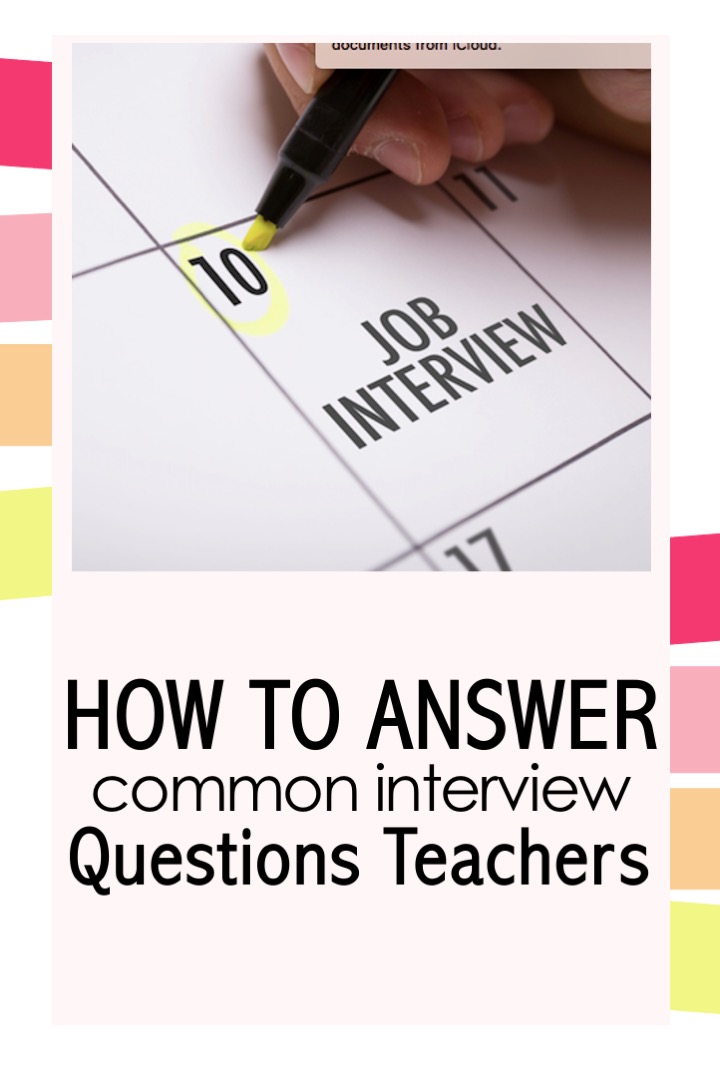
Unlock the secrets to answering teacher interview questions with confidence, paving the way for a successful and impactful career in education!
Questions Teachers Are Asked in Interviews
Tell us about yourself.
Okay, okay, technically not a question but most interviews start with this. It’s a way for them to break the ice and start the interview. I would go in with this question telling where you are from and about your teaching experience. If you are interviewing for your first teaching job, share about your college program, student teaching, and why you decided to become a teacher. Share why you love teaching. Those who are interviewing you want to hire teachers that love teaching and have a passion for it.
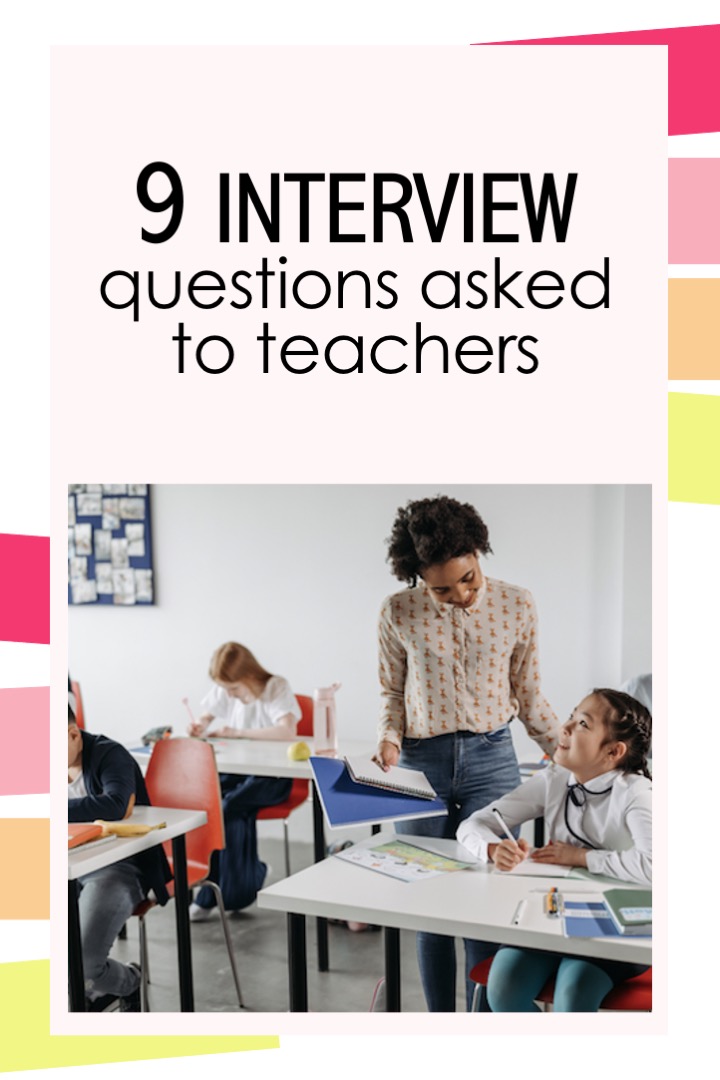
Nail your teaching job interview by mastering the answers to these common questions that every educator should be prepared for!
What’s your teaching philosophy?
Among the common interview questions asked to teachers, this one is at the top of the list. I would share a mantra that you follow in terms of education and then go into specific examples of how you have followed that in your teaching experience. For example, if your mantra is something like, “Students have unique needs. It is up to me to help students grow where they are at.” Then I would share how I noticed a student was bored in math because he already knew the skill we were working on and how I gave him an extension activity. Or how I noticed a specific student didn’t know simple sight words. So every morning while the rest of the class was doing morning work, I would pull over this child and work on those sight words with him for 5 minutes. After a couple weeks, he knew all those sight words and increased his reading fluency.
What does classroom management look like in your classroom?
Principals want to know that you can handle a class. And how can they know you really can do that? If you share specific examples. Are you starting to see a pattern now? Examples are key in interviews. It is how you “show” rather than “tell.” For this one, I would first share my classroom management plan and then share specific stories.
For my classroom management plan I share how I set a good foundation at the beginning of the year. I get my students involved in creating a classroom agreement. These are like our class rules. During the first week of school, I read my students picture books that teach lessons on how we should act and treat others. As we read those books we list out the things we learn. Then we compile those into categories and I type it up on a nice poster. Students then sign the poster and this shows they commit to follow those rules in our classroom. Find more information about creating a classroom agreement here in this blog post: How to Make a Class Agreement for Elementary.
I also share how last school year, as a class we recited our class rules every morning. Soon the kids wanted to make up hand signals to go with each rule. I knew that if my principal ever stopped a student in the hallway and asked them what our class rules were, my students would be able to say them with no problems.
To also set a good foundation, I share how I explicitly teach classroom routines and procedures. I have a powerpoint with all the steps to my classroom routines and procedures written out. During the first week of school, my class learns each one by reading the steps with me. I model how it should look and sound, and students take note of how it should look and sound. Then I have them practice it. We practice it until it is perfect and exactly how I like it. I share an example of how after learning the routine of students moving from their desks to the carpet area how they did it out of order and how students were talking and being silly while moving. I quickly pulled up the slide and reviewed the expectations with students and had them practice it. To learn more about this process and about the routines I teach in my classroom read this blog post here: Top 9 Classroom Routines and Procedures. Number 3 is a Life Saver!
I also share that throughout the week when I see students are quick with transitions, they can earn extra Fun Friday time. I simply write “+5” up on the whiteboard. When students are talking over me or are slow with transitions I will take away Fun Friday time by writing “-5” up on the board. At the end of the day on Friday, I add up the time and add it into our scheduled Fun Friday time. This is a time when students can play games and play with the toys I have in my classroom. I also work with students that didn’t get their work done throughout the week. It really motivates students to get their work finished and no one has to miss recess. Learn more about Fun Friday here in this blog post: 3 Fun Friday Ideas For Classroom Management
Then I go into behavior incentives and how I have three different levels: individual rewards, group rewards, and whole class rewards. I like to show this in my Teacher Interview Portfolio. This is where I put notes on all the important topics I will probably be asked about during the interview. I show the three different levels.
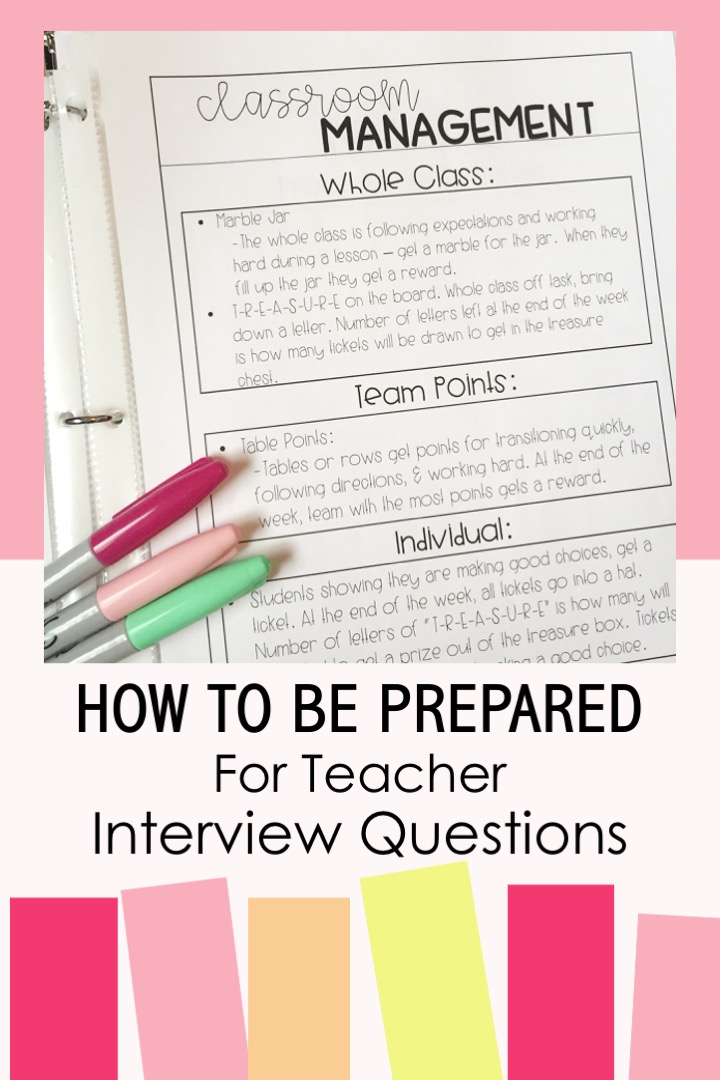
Navigate the path to successful teaching with insights into common interview questions on classroom management.
For individual rewards, I give students punches on a punch card and when they fill it up they get to choose a student coupon. These are fun classroom rewards like sitting in the teacher’s chair or bringing a stuffed animal to class.
For group rewards, I share how I arrange student desks in three rows. When a row is quick on a transition or all on task I will give them a row point. The row with the most points at the end of the day on Friday, gets a little treat.
And for whole class rewards, we have a class flower. When students have amazing behavior for our math or reading block, I give them a petal. When the flower gets all 10 petals, they earn the reward at the center of the flower. Students even vote on the reward they want to work towards. These rewards included eating lunch in class, extra recess, and a pajama party. Students can also earn a petal by reaching our class behavior goal for the day, meeting our centers expectations, and getting a compliment from our specials teachers. Learn more about this whole class reward system here: The Best Whole Class Rewards System Ever!
Now I know that was a lot of information about classroom management, but I wanted to give you a lot of ideas, especially if you are a new teacher. Don’t be afraid to take some time to answer this question. I’d say it is one of the most important questions teachers are asked in interviews. So make sure you are prepared. They may even ask a follow up question…
How have you helped a student with difficult behavior?
This one is where you are going to have a specific answer and story. But also include how you built a relationship with this student, how you gave consequences, how you communicated with parents, and how that helped that student.
How do you promote a positive classroom environment?
I like to share what I do to show respect to students. It can be simple things like saying please and thank you to students.
You could share how you have students applaud for each other after one shares about a project. Or how you teach them to do a certain hand signal when they agree with something a classmate has said.
I also share how I get students involved in our classroom setup during the first week of school. They help make our bulletin boards, schedule cards, and their name tags for their desks. Doing these things help students take ownership in their classroom. Learn more about how I get my students involved in classroom set-up here in this blog post: Meaningful Classroom Setup Ideas
How do you communicate with parents?
For this one you can tell that you have a monthly/weekly newsletter you send home with parents. Or how you use an app like ClassDojo to easily message parents and send out reminders. I like to share that with these apps, I’ll take pictures of what students are working on and add it to our class stories on the app. That way parents can start conversions with students at home about what we are learning about. I also like to mention that if I need to contact parents about serious things, I like to do it with a phone call rather than message or email. A lot of miscommunications can happen with emails and messages.
I like to type out all the ways I communicate with parents in my Teacher Interview Portfolio. Find the one I use here.
How do you meet students’ unique needs?
You can share how you first need to come to know their academic needs through assessment. Share a story of you giving an assessment and what you did with the data. Did you pull those students and work with them one-on-one during morning work? Did you make small groups and plan activities of what they needed to work on?
You can also share how you group your students during your centers time and how you differentiate their work.
Or you can share about the fast finisher activities you do as extension activities for students who finish their work early. Learn more about the fast finisher activities I use in my classroom in this blog post here: 12 Fast Finisher Activities That Are So Fun
I like to type out my differentiation plan in my Teacher Interview Portfolio. Find the one I use here.
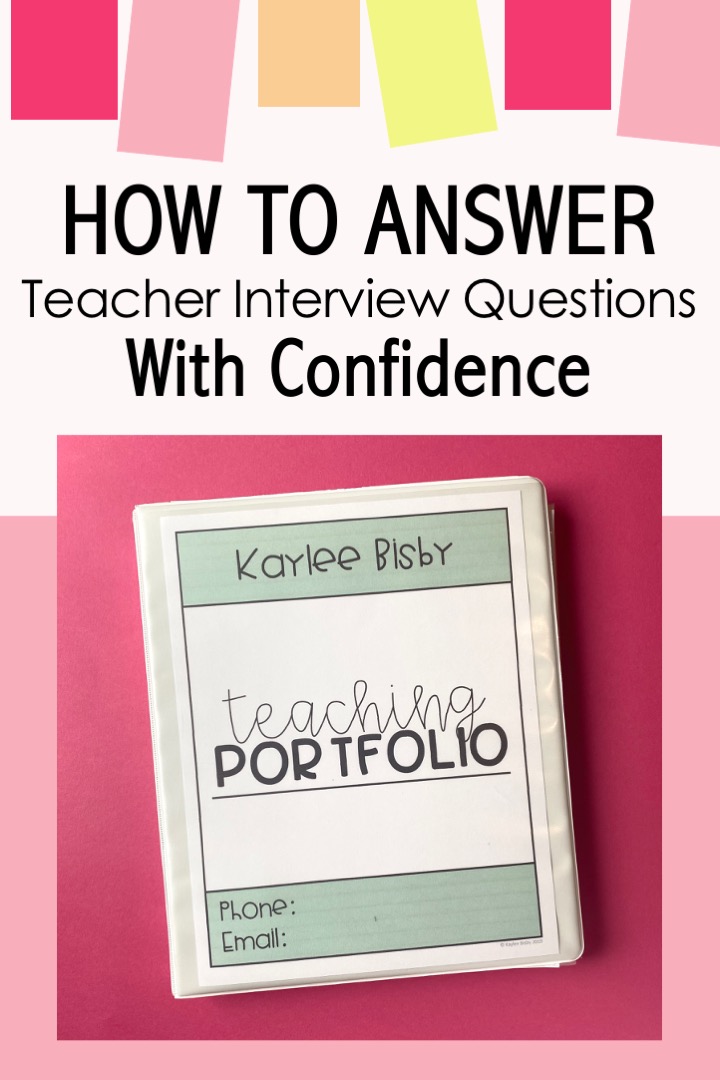
Learn to use a teaching portfolio to your advantage!
How have you collaborated with other teachers?
With this interview questions teachers are asked, principals want to know that you can get along with other teachers. I like to share that usually the best professional development is just down the hallway. When I had a particular problem, I would go down to the other second grade teachers in my building and see what they do to solve the problem. I also share that with our reading program the grammar component was lacking in learning activities. So I created a powerpoint to help teach the standards and have engaging activities for students to do. I simply shared those PowerPoints with the other second grade teachers so they could use them if they wanted. Teaching is a lot of hard work, so if we can help each other save time, all the better. I also share how we met as a second grade team throughout the school year to have data meetings. We would look at students’ reading scores and divide them into our intervention groups based on their needs. We worked together as a team to meet students’ needs.
Interview Questions for Teachers to Ask Principals
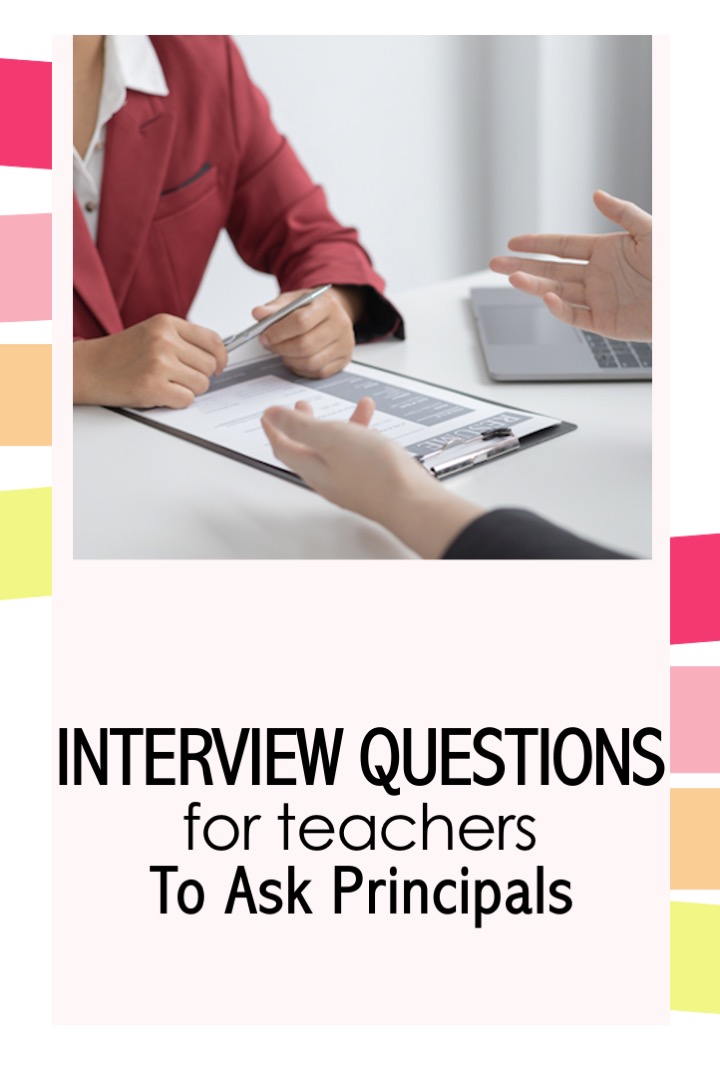
Elevate your teaching journey by knowing the right questions to ask principals during interviews, paving the way for a successful and fulfilling career in education!
Usually the last interview questions teachers are asked is when the principal asks what questions you have for him. It’s a good idea to have a couple questions in your head ready to ask. Here are some ideas: What is your favorite part about working at this school? What does the school culture look like here? How do teachers work together and collaborate here? What do specials classes look like here?
Like I mentioned before, the more you are prepared for the interview, the more confident you will be and the more you can be yourself during the interview. I like to write out all of my ideas to these common interview teacher questions in a teacher interview portfolio. Typing out my ideas gets them solidified in my mind. Find the teacher interview portfolio I use here.
For more teacher interview tips, check out this blog post: Teacher Interview Tips to Help You Land the Job
